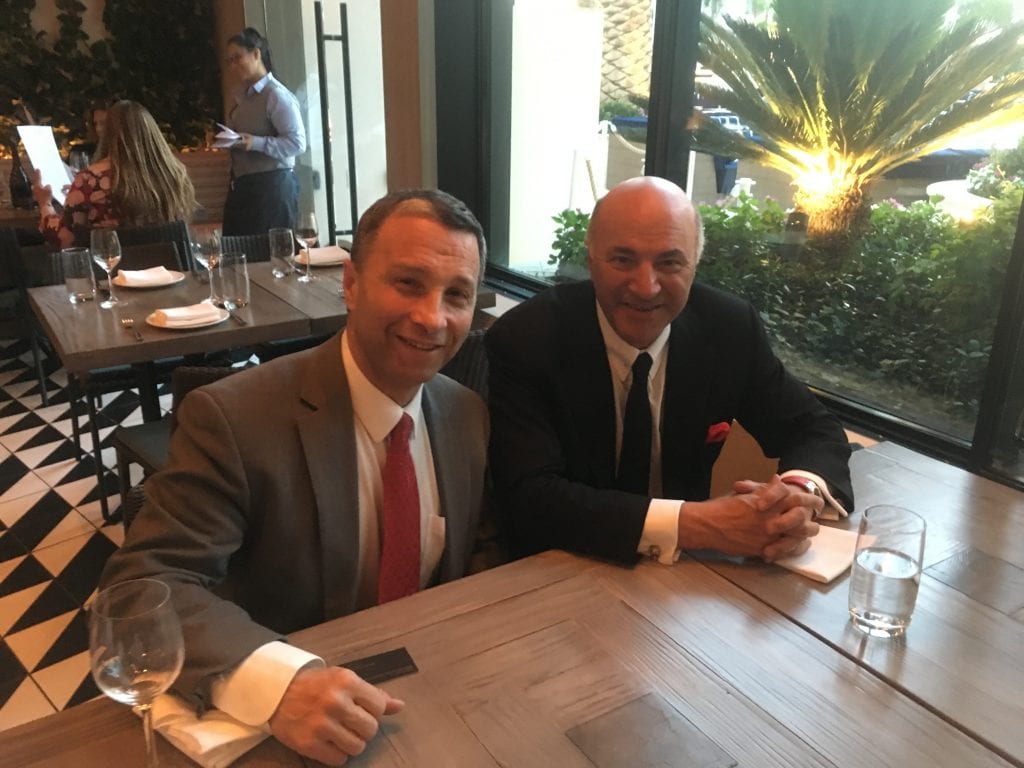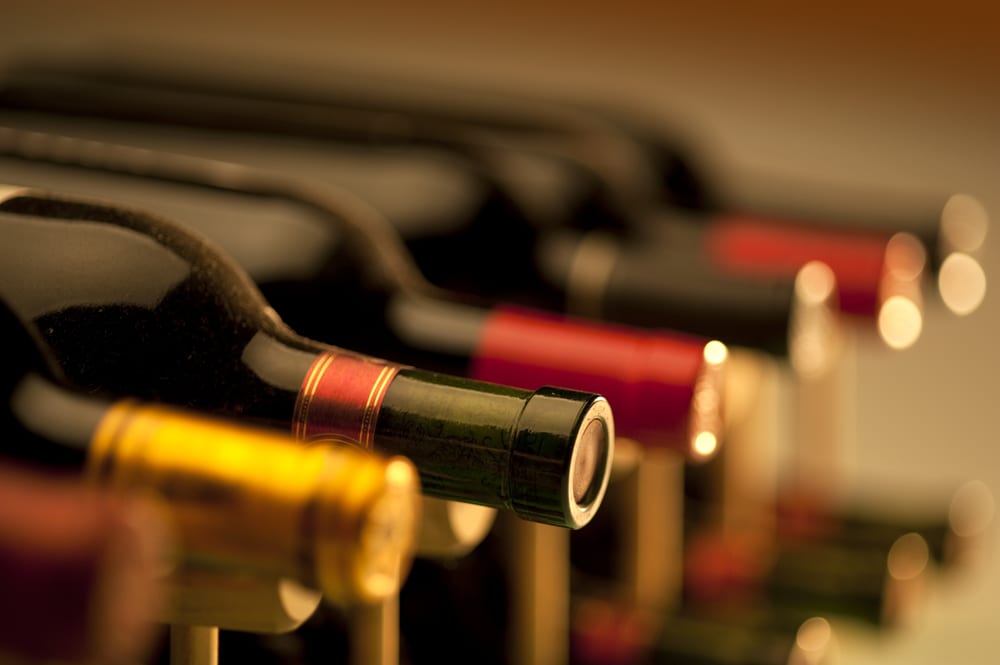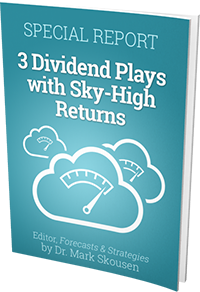He also is a discerning fan of fine food, as evidenced by the delicious and spicy sushi he ordered. I also discovered much of his childhood included living in different countries that let him learn from the local cooks who were hired to prepare meals for his family.
O’Leary Invests in Wine Vintages That Appreciate More than Stocks
The best vintages of wine are among rare collectible assets that are appreciating more than the stock market, O’Leary told me. Other collectibles that have jumped in value beyond the stock market’s rise include top-end guitars, watches and pens, he added.
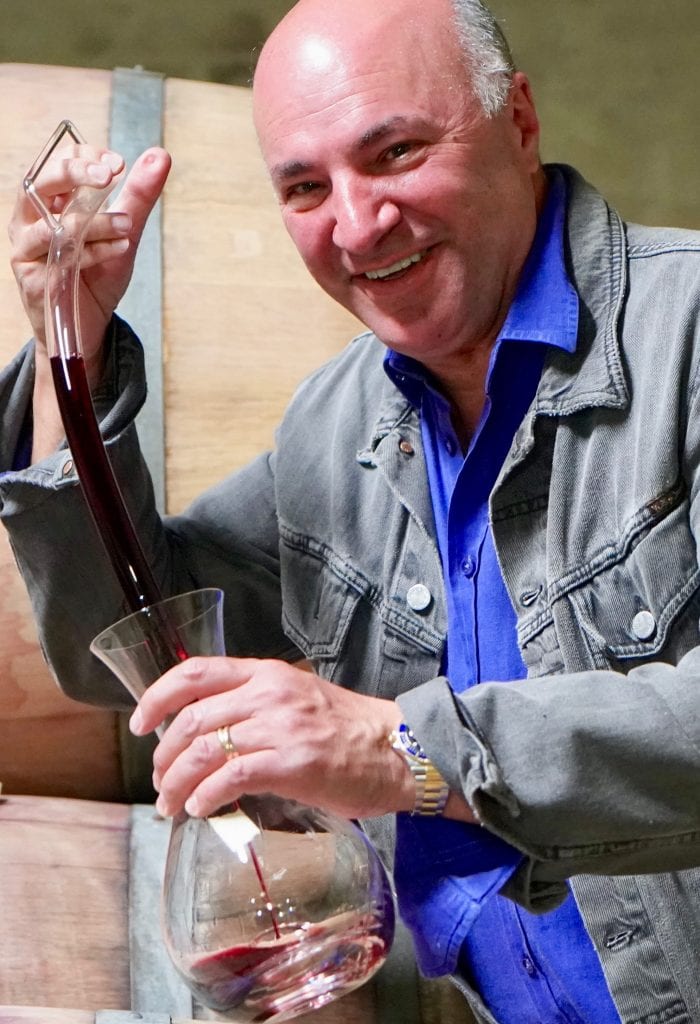
Vineyard owner O’Leary tests his product.
Advertisement.
“Shark Tank” watchers may recall O’Leary investing a then-record $2.5 million for a 10 percent stake in a wine business called Zipz Wine. The company offers a line of single-serving wines in recyclable and resealable plastic glasses that are engineered to provide a much longer shelf life than its competitors.
“I’ve never been so excited for a #SharkTank deal!” O’Leary tweeted after the show aired on ABC.
O’Leary Invests in Wine Owned by Divorcing Couples
Wine lovers who have amassed collections of coveted vintages that have their prime years for consumption ahead offer a fertile market to buyers when the owners either divorce or die. O’Leary said he and a syndicate of investors can respond quickly to assess the value of the holdings, make an offer and provide cash payment to the sellers.
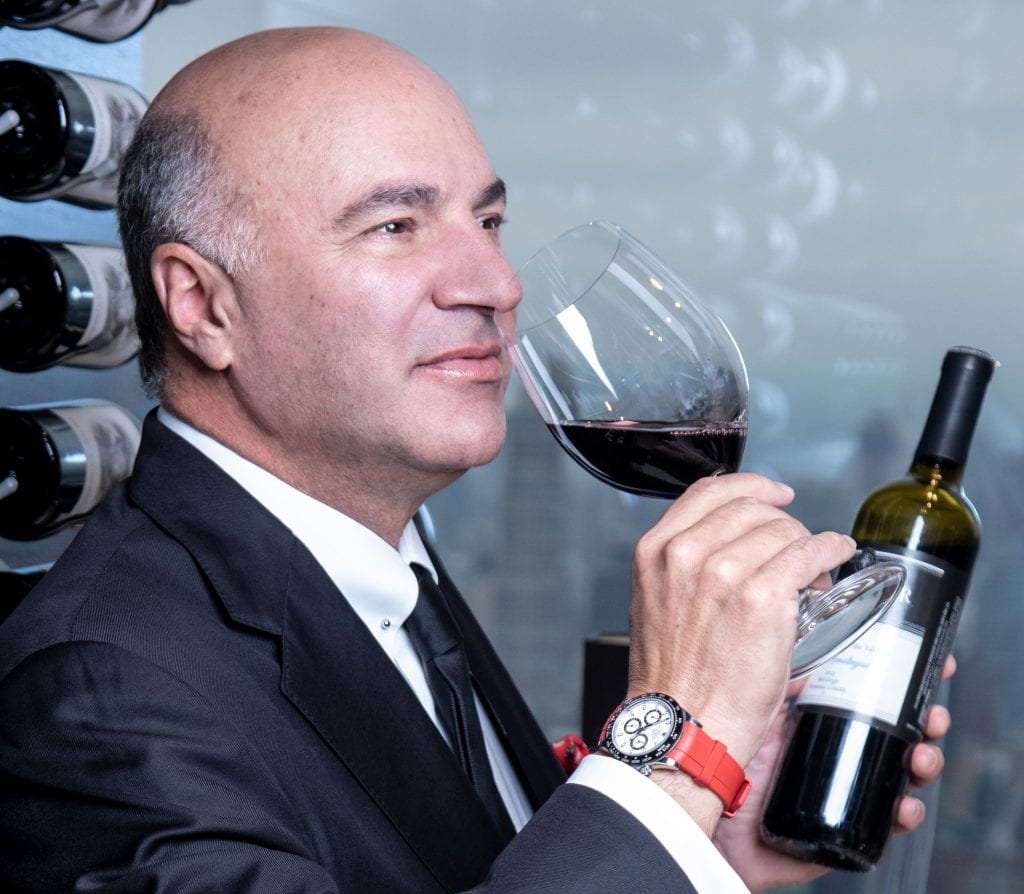
Wine connoisseur O’Leary sniffs the aroma of a quality wine.
Advertisement.
First and second growth Bordeaux and top Burgundy Gran Cru are some of the very few wines worth investment, said Eric LeVine, founder/CEO on CellarTracker, which provides a platform for collectors and enthusiasts to manage their wine cellars and share opinions on wines. However, many collectors resent the “entire concept” of wine investment, he added.
The 1855 Bordeaux classification developed rankings of the best Bordeaux wines in five unique classes for the red wines, with the region’s top wine regarded as first growth, receiving an A+. A second growth wine is given an A-, a third growth obtains B+, a fourth growth gains a B and a fifth growth gets a C+, according to the Wine Cellar Insider
For those who also share O’Leary’s interest in investing in the finest wines for potential resale, London-based valuations firm Knight Frank, formed in 1896, reported that the best bottles of wine can be auctioned for hundreds of thousands of dollars. In fact, Knight Frank’s annual report about the biggest transactions in collectibles reported that the most expensive wine sold at auction in 2018 was a bottle of 1945 Domaine de la Romanée-Conti. That wine was sold by Sotheby’s for $558,000.
O’Leary Is Far from Alone in Investing in Wine
One trend that manifested itself in 2018 is further rapid price escalation of Burgundies, with top Grands Crus from Raveneau, Romanée-Conti, Roumier and Rousseau leading a 33 percent ascent of the Knight Frank Burgundy index from the previous year. It is likely that the pattern of “polarization favoring blue-chip wine” from top producers will continue, according to the Knight Frank report.
The prices particularly climb as the wines approach their “drinking windows,” the report noted.
“If you are investing in wine, you would want to focus on first growth Bourdeauxs, Italian Super Tuscans, some of the Spanish Vegas and California, Washington and Oregon ‘cult’ wines,” said Tom DiNardo, CEO and senior wine appraiser for Seattle-based www.WineryandWineAppraisals.com. “Cult wines are wines that are offered by wineries that sell out on the first day of release. Examples of cult wines are Screaming Eagle Cabernet Sauvignon out of Napa, California, and Quil Ceda Creek Cabernet Sauvignon, out of Columbia Valley, Washington.”
Changes in wine prices enhance the importance of current appraisals.
“Wine investors and collectors should strongly consider having their spirits and wines appraised for their insurance policies and/or as a preventive measure in protecting them from a loss claim,” DiNardo said.
Wine Investing Has Challenges, along with Other Collectibles
Even though buying and storing wine has challenges that include shipping, storing at the right temperature and monitoring to ensure the vintage year and type are managed to maximize sales value, O’Leary cautioned that other collectibles can carry even more risks.
For example, Canadian entrepreneur and investor Miles Nadal agreed to pay $850,000 for a collection of 99 pairs of rare, unworn sneakers from Nike, Adidas and Air Jordan on July 18 at an auction by Sotheby’s and digital retailer Stadium Goods. The high price shows rare sneakers are coveted collectibles, CNBC reported.
However, rare sneakers need to be inventoried and kept at a certain temperature to preserve the rubber, O’Leary said.
Nadal, an entrepreneur and collector of classic cars, beat out all bidders again on July 23 when he set a record by paying $437,500 for a pair of Nike waffle-soled running shoes that were designed by the shoe manufacturer’s co-founder Bill Bowerman for the 1972 Olympic Trials. Nadal plans to display the 100 pairs of sneakers he purchased at his private Dare to Dream Automobile Museum in Toronto.
O’Leary Invests in Wines and Gains Diversification
Investing in collectibles helps to diversify an investor’s portfolio as a hedge when neither stocks nor bonds deliver the desired returns, said Hilary Kramer, a Wall Street money manager who heads the Value Authority, GameChangers, Turbo Trader, High Octane Trader and Inner Circle advisory services.
Kramer cautions, however, that unless an investor is talented or uses an astute appraiser, it is difficult for most investment-grade collectibles to keep up with inflation over the long term.
“Stocks around the world have gained about 5 percent a year going back to 1900, Kramer said. “Wine comes closest with a 3.7 percent return over that time period. Art did even worse.”
Most people sacrifice returns to own something more aesthetically pleasing than some letters and numbers on a brokerage account statement, Kramer said. But there still will be periods like the late 1980s when classic cars, for example, outperformed the S&P 500 by enticing investors who pulled money out of the stock market, she added.
A time collectibles paid off occurred in the 1940s when fine wine was scarce and bottles sold at steep premiums, Kramer said. Top guitars are trading at premium prices now, too, she added.
“But if you’re all about the money, I’m still a fan of stocks and I’m not alone,” Kramer said. “The latest survey of the world’s wealthy people found that the elite only keep 6 percent of their net worth in collectibles. For most of us, it’s fun, not finance.”
Investors who love wine may be happy to indulge in purchasing special vintages that have the best chance of appreciation. However, the risk seems high compared to stocks that historically rise and also may pay dividends, except for well-heeled wine lovers like O’Leary and his peers who have the connections and wealth to acquire entire collections through distress sales that give the seller quick cash and the buyers a chance to turn big enough profits to make it worthwhile.
Publisher’s Note: Special thanks goes to Mark Skousen for inviting Kevin O’Leary of “Shark Tank” to speak at this year’s FreedomFest in Las Vegas. StockInvestor.com and Eagle Financial Publications were premier partners at July’s Freedom Fest event. Mark founded FreedomFest in 2007 to bring together the best and the brightest thought influencers from around the world to talk, strategize, socialize and celebrate liberty. With this year’s impressive attendance of 1,920 people, the three-day festival continues to live up to its billing as “the world’s largest gathering of free minds.” You can learn more about FreedomFest by clicking here to reach the official website.
Paul Dykewicz, www.pauldykewicz.com, is an accomplished, award-winning journalist who has written for Dow Jones, the Wall Street Journal, Investor’s Business Daily, USA Today, the Journal of Commerce, Seeking Alpha, GuruFocus and other publications and websites. Paul is the editor of StockInvestor.com and DividendInvestor.com, a writer for both websites and a columnist. He further is the editorial director of Eagle Financial Publications in Washington, D.C., where he edits monthly investment newsletters, time-sensitive trading alerts, free e-letters and other investment reports. Paul previously served as business editor of Baltimore’s Daily Record newspaper. Paul also is the author of an inspirational book, “Holy Smokes! Golden Guidance from Notre Dame’s Championship Chaplain,” with a foreword by former national championship-winning football coach Lou Holtz. Follow Paul on Twitter @PaulDykewicz.
